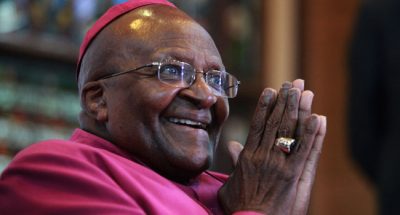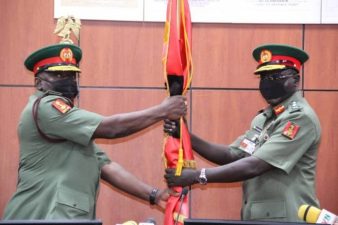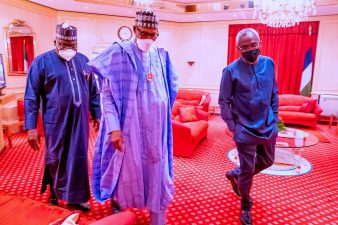By Muhammad Ajah
What President Muhammadu Buhari told the Minister of State Foreign Affairs, Hajiya Khadija Bukar Ibrahim and the Chairman/Chief Executive Officer of the National Hajj Commission of Nigeria (NAHCON), Barr. Abdullahi Mukhtar Muhammad, at the presidential villa recently can be described as the commitment of the Federal Government for the success of the forthcoming 2018 Hajj. This commitment was made when the President received briefing from the duo on the 2018 Hajj Memorandum of Understanding (MoU) signed between Saudi Arabia and Nigeria early January this year. The MoU contains every obligation binding on each party for the Hajj operations.
It is heartwarming to acknowledge that the synergy between the Ministry of Foreign Affairs and NAHCON as well as the collaboration between NAHCON and other relevant Federal Government agencies has sustained the yearly success recorded after every Hajj. This is notwithstanding the fact that NAHCON is being supervised by the Office of the Secretary to the Government of the Federation (SGF). The Ministry through its diplomatic corps in the Kingdom of Saudi Arabia has been a worthy partner in progress in the service of Nigerian pilgrims.
This commitment of Mr. President touched on four key areas of interest which the Federal Government needs to back up with actions: the welfare, health and security needs of Nigerian Muslim pilgrims while in Saudi Arabia as well as the challenges faced by intending Umrah pilgrims from Nigeria. Umrah is a lesser Hajj that runs throughout the year and if it faces challenges, then greater precautions should be taken to ease the 2018 Hajj for Nigerian Muslims.
President Buhari was told that Nigeria’s approved quota for Hajj 2018 was 95,000 slots with 75,000 going to State Pilgrims’ Welfare Boards and Agencies and 20,000 going to Private Tour Operators. There are 38 boards: 36 States of the federation in addition to the Federal Capital Territory Abuja and the Armed Forces which will utilize the 75,000 slots. This year, 117 private tour agencies have been approved by the commission to utilize the 20,000 slots. Mr. President was also informed about some new policies introduced by the Saudi Arabian Government which included payment of Value Added Tax (VAT) by all consumers of goods and services in Saudi Arabia beginning from January 1, 2018; fixing of May 2018 as the deadline for the conclusion of all Hajj arrangements and the introduction of biometric data capture for all intending pilgrims.
The welfare of Nigerian pilgrims encompasses everything that will ease their journey to and from Saudi Arabia and make them happy. It also includes what the pilgrims need to pay to receive services offered to them in Saudi Arabia by the Hajj authorities. Such services are numerous and each one is paid for by the pilgrim. The costs of these services are predominantly determined by the Saudi authorities and they are reviewed yearly. The welfare of the Nigerian pilgrims is the determinant factor to the success or otherwise of each Hajj exercise.
The briefing to Mr. President was clear. The change sweeping across all aspects of Saudi economy is a case study and the Saudi government is interested in Hajj as a major income earner more than ever before. It is reaching a level that some Muslims across the world are beginning to feel that Hajj is being commercialized. But alas! The Holy Ka’aba and the Masha’ir of Mina and Arafah are the only places where activities of Hajj can be performed till the end of the world. Muslims must perform Hajj but it is very necessary for authorities which organize it for the people of their countries to seek ways to ameliorate the effects of the Saudi Arabian policies on their pilgrims.
The costs of every social amenity in Saudi Arabia have increased. There has been a rise in the pump price of fuel. Like in Nigeria, such rise in the pump price definitely would affect transportation cost and every other thing. Also there is the introduction of five percent VAT on all goods. To cap it all, all payments for Hajj services must be concluded within the month of Ramadan this year which falls in the month of May. And to add pressure, the official rate of Naira to US dollar in Nigeria has been raised by the Central Bank of Nigeria (CBN) from N305 as it was last year to N307 in 2018. It is really heartbreaking.
From all these permutations, there lies the possibility of the 2018 Hajj fares being higher than the 2017 Hajj. Recall that the 2017 Hajj fare was about N1.5million! Recall the outcry that greeted it! Here is the trouble for the Nigerian pilgrims. It is here that the relevant government organs, including the National Assembly, are required to intervene and press for a reduction, however slight, in the official rate. Some civil society organizations have suggested between N200 and N250 to a US dollar. They should act fast. The commitment of Mr. President should be translated into practical action by collaborating with the lawmakers on this matter.
The tension and threats which the N305 official exchange rate posed on the 2017 Hajj exercise can now only be imagined. That high official exchange rate caused the rise in the cost of 2017 Hajj because 98 percent of Hajj fare components are computed in the US dollars. This matter was over-flogged last year and the National Assembly promised to address the matter but to no avail until the Hajj was over. This year should be different. The deadline of May is by the corner.
The health and security needs of Nigerian pilgrims have, over the years, been professionally and successfully handled by the Hajj commission in collaboration with the relevant federal government organs. In short, medical services to the pilgrims have gone digital and the abuse of drugs by some pilgrims in the past have been curtailed. The federal ministry of health has performed well in this aspect. All required vaccines for the pilgrims are provided in good time; the port health officials administer the drugs and issue certified yellow cards to pilgrims; all the drugs required for the entire Hajj are procured in good time and clinics are located within the pilgrims’ accessibility in Madinah and Makkah. All health and hygiene related matters during Hajj have recorded tremendous improvements.
An area that demands commendation for the Nigerian Hajj authority is the unified medical team. In the last two years, the number of medical personnel, including health workers who accompany pilgrims to Hajj, has reduced from over 3,000 to about 400. This has allowed the country to benefit from the services of personnel who used to abandon their duty posts in federal medical facilities to go to Hajj in the name of serving pilgrims. State Boards contribute 60 percent of the total medical workforce, leaving the remaining 40 percent for the commission to source. Mr. President should, therefore, be assured of sustenance of the medical record.
On the safety and security of pilgrims, the issue of pilgrims rioting while in Saudi Arabia is no more heard of and this has made the work of the national security team constituted for every Hajj exercise easier. What more could be expected from pilgrims who now get better services, travel on schedule and return home on schedule. Yet, the national security team does not rest on its oars due to the unpredictable nature of human beings.
The challenges faced by intending Umrah pilgrims from Nigeria this year is due to the newly introduced biometric capturing of every individual pilgrim. The centers for the capturing are currently only in Abuja, Lagos and Kano. NAHCON has officially protested against the development. However, Saudi Arabia has conceded to increasing the centers from three to ten.
I must assert that the exigency of this piece comes from the point that Mr. President’s promise should be backed with actions now that every intending pilgrim is waiting for the announcement of the fares for the 2018 Hajj. Hajj fare components are computed in US dollars. Of note, once more, is the fact that every service in Saudi Arabia has increased. On the other hand, the deadline for payments for all services required by the pilgrims during Hajj is not far from now. Here lies the urgent need for intervention by the government over 2018 Hajj fare.
The custom of preparing for Hajj after Ramadan has become obsolete. There is serious competition amongst countries of the world over acquisition of better services for their pilgrims. Nigeria has been in the top list of countries with excellent services to her pilgrims. It is only early payments that can guarantee provision of these services; therefore the pilgrims pay for them for onward transfer to the service providers. The slow pace of payment by the pilgrims, investigations have revealed, is due to their hope that the executive and the National Assembly may do something tangible to reduce the 2018 Hajj fare from the last year’s that was about N1.5million.
*Muhammad Ajah is an advocate of humanity, peace and good governance in Abuja. E-mail mobahawwah@yahoo.co.uk.




